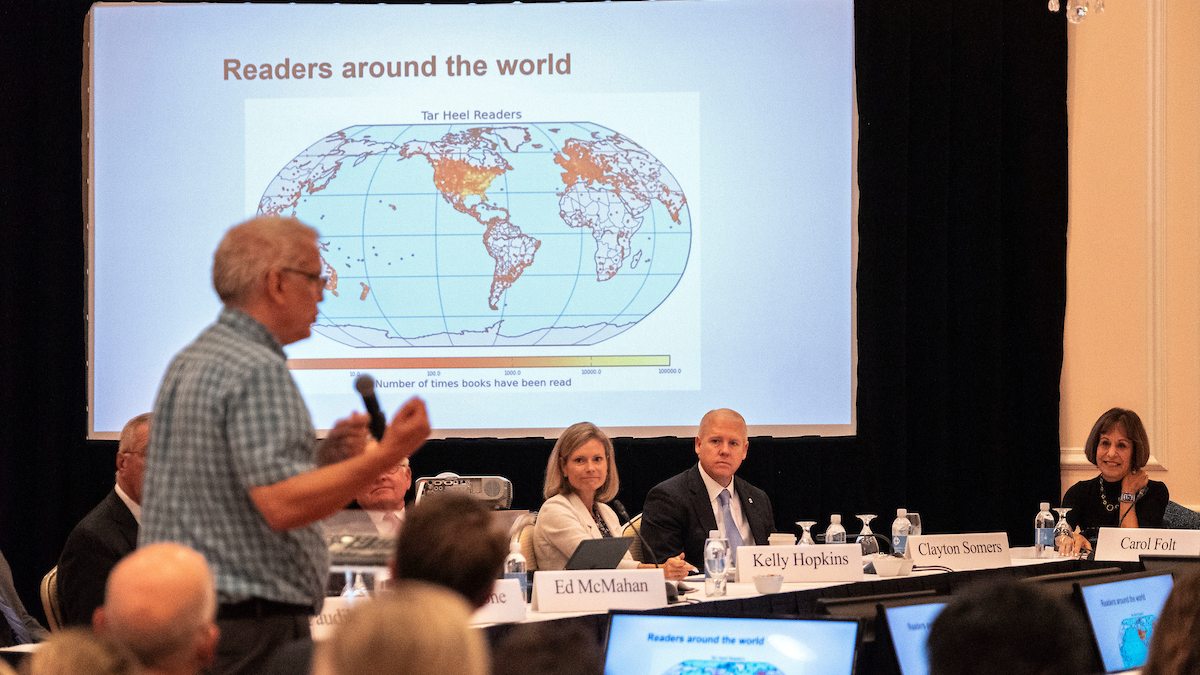Chancellor announces $2 million fund, new hub to help students affected by hurricane
At the Sept. 27 meeting of the University Board of Trustees, Chancellor Carol L. Folt announced the creation of the $2 million Florence Student Emergency Fund and discussed the next steps for the disposition of the Confederate monument.

Carolina students affected by Hurricane Florence are receiving unprecedented emergency support from the University, which has set up a $2 million fund and a resource hub in the days following the disaster.
At the Sept. 27 meeting of the University Board of Trustees, Chancellor Carol L. Folt announced the creation of the $2 million Florence Student Emergency Fund and the Student Success Hub for Florence Recovery for those affected by the hurricane. The fund will provide support to students faced with unexpected financial hardships following Hurricane Florence, while the hub will streamline academic, financial aid and other support processes for students.
The University will provide $1 million for the initiative from its trademark licensing revenue and income from UNC Student Stores, in addition to funding that the University has already committed to need-based scholarships. The additional $1 million will be raised through a philanthropic match. The campus and the community can donate at giving.unc.edu/gift/relief.
“Today we are sending a clear message to our students who were affected by the devastation of Hurricane Florence and their families: We are here for you,” Folt said. “Recovering from a storm like Hurricane Florence takes time and resources. Carolina is a generous, caring community and many who were spared the fury of Florence have asked how they can help students whose families are still suffering in its aftermath. We’re grateful to be able to create this fund to support our fellow Tar Heels in their time of need.”
The Student Success Hub, set up in room 2416 at the Student Union, is a one-stop location for students affected by the hurricane to meet with staff from across the University who work them to develop individualized plans to meet their financial, academic and other support needs.
The hub opened Sept. 24. Executive Vice Chancellor and Provost Bob Blouin charged the small group with developing fair policies for the emergency situation that are “clear and simple and unencumbered by bureaucracy,” adding that, if they made missteps in the process, to “err on the side of compassion,” Vice Provost for Enrollment and Undergraduate Admissions Stephen Farmer told the trustees.
In the brief time of the hub’s operation, its staff has already heard stories from students that have been “meaningful and powerful,” said Desirée Rieckenberg, senior associate dean of students. She related the story of a veteran student living near a military base who came into the hub overwhelmed and shaken by the disaster.
“In one meeting, he met with four different people and they were able to give him a plan, all in one location,” she said.
Carolina students who are experiencing financial hardship due to Hurricane Florence and wish to take advantage of these resources should visit the Student Success Hub in the Student Union or send an email to florence@unc.edu.
Monument conversation
In addition to hurricane recovery, the trustees and Chancellor Folt also discussed next steps for the disposition of the Confederate monument, Silent Sam, toppled from its pedestal by protesters last month.
Charged by the UNC Board of Governors and UNC System President Margaret Spellings to come up with a plan for the “disposition and preservation” of the monument by Nov. 15, the University has begun a process to receive feedback from the campus community on the topic.
“We not only want your help, we need your help. We need your creative ideas,” Chair Haywood D. Cochrane Jr. said in his opening remarks.
Folt also encouraged the campus community to get involved in the process by sending ideas to the email address uncmonument@unc.edu. She added that the Faculty Executive Committee and the Student Advisory Committee are helping to organize a series of conversations about the monument.
“It’s going to be important for us as an institution to be talking about this together,” Folt said. “If you have an idea, we’ll find a way to hear it.”




